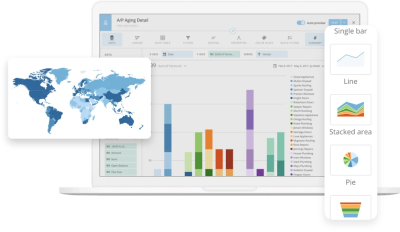Tips for choosing the right reporting tool for your business
There are a lot of choices to be made when it comes to business intelligence (BI) reporting tools. It can be difficult to decide which one is right for your organization.
But what does that actually mean? How can you make a decision that’s best for your business while still getting all the features and functionality you need?
BI tools have changed dramatically in recent years. They’ve become more user-friendly and easier to implement, but they still vary widely in terms of features, pricing, and deployment options.
So, how do you know which tool is right for your business? In this article, we will break down the different features of popular BI reporting tools, as well as some tips on how to choose the right one for your business based on a variety of unique needs.
The first step to understanding BI is to know what it is. Let’s kick off our guide with a definition.
What is business intelligence (BI)?
Business intelligence is the process of turning data into insights that help organizations make better decisions. BI reporting tools are software applications that allow businesses to collect, organize, and analyze data to get those insights.
BI reporting tools can be used for a variety of purposes, including:
- Identifying trends and patterns: BI reporting tools can help you spot trends in your data so that you can make better decisions about where to invest your time and resources.
- Forecasting future outcomes: BI reporting tools can also be used to predict future outcomes based on past data. This can help you make decisions about things like inventory levels and staffing needs.
- Improving operational efficiency: BI reporting tools can help you identify inefficiencies in your business processes so that you can make changes to improve them.
- Generating new revenue: BI reporting tools can be used to find new opportunities for revenue generation. For example, you might use BI to identify new customer segments or target markets.
Why should my business care about BI?
There are a number of reasons why businesses should care about business intelligence. Here are just a few:
- Make better decisions: BI can help businesses make better decisions by providing insights that would otherwise be hidden in data.
- Save time and money: BI can help businesses save time and money by automating tasks like data collection and analysis.
- Improve customer satisfaction: BI can help businesses improve customer satisfaction by providing insights that can be used to improve product quality or the customer experience.
- Gain a competitive edge: BI can give businesses a competitive edge by providing insights that can be used to make better decisions about marketing, product development, and more.

What are the different types of BI reporting tools?
Now that we’ve answered the question “what is business intelligence?” it’s time to take a look at the different types of BI reporting tools. There are three main types of BI reporting tools:
1. Self-service BI tools
2. Enterprise BI tools
3. Cloud-based BI tools
Let’s take a closer look at each of these types.
1. Self-service BI tools
Self-service BI tools are intuitive and designed to be used by non-technical users. They typically have an easy-to-use interface and require little to no training to use. Self-service BI tools are often used by small businesses because they are less expensive and easier to implement than enterprise BI tools.
For example, smaller businesses might use a self-service BI tool to build their own reports and dashboards for easy data visualization.
2. Enterprise BI tools
Enterprise BI tools are designed to be used by technical users, such as data analysts and developers. They typically have more robust features than self-service BI tools but can be more difficult to use. Enterprise BI tools are often used by large businesses because they have the personnel that can handle more complex data analysis tasks.
When your company needs more than just basic reporting and visualization, you might need an enterprise BI tool. These tools are designed to handle more complex data analysis tasks, such as predictive analytics and advanced data modeling.
3. Cloud-based BI tools
Cloud-based BI tools are hosted in the cloud and can be accessed from anywhere with an internet connection. They are often used by small and medium-sized businesses because they are less expensive and easier to implement than on-premises BI tools. Both self-service and enterprise BI tools can be cloud-based.
With cloud-based BI tools, businesses can get started quickly and easily without having to worry about complex infrastructure.

How to choose the right reporting tool for your business
So where do you start when trying to decide on the right BI reporting tool for your business? It can be overwhelming with all of the different options on the market. Here are a few factors to consider when making your decision:
1. What is the size of your company?
First, consider the size of your company. Are you a small business with less than 50 employees? If so, you might want to consider a self-service BI tool. These tools are typically less expensive and easier to implement than enterprise BI tools.
2. What type of data do you need to report on?
Next, think about the types of data you need to report on. Do you need to report on financial data, sales data, customer data, or all three? There are BI reporting tools that specialize in specific types of data. Other tools specialize in bringing in diverse data from a variety of sources and storing it in a central data warehouse.
3. What is your budget?
Another important factor to consider is your budget, as BI reporting tools can drastically range in price. Make sure you have a clear understanding of your budget before making your decision.
5. What is the technical expertise of your team?
You should also consider the technical expertise of your team. If you have a team of data analysts, they will likely need an enterprise BI tool with more robust features. However, if you have a team of non-technical users, they might be able to get by with a self-service BI tool.
6. What is your implementation timeline?
Your implementation timeline is another important factor to consider. If you need a BI reporting tool to be up and running quickly, you might want to consider a cloud-based tool. These tools are typically easier to implement and adopt than on-premises BI tools.
The bottom line
Reporting tools are changing the game when it comes to business intelligence. The right tool can give you the insights you need to make better decisions and improve your bottom line.
When choosing a reporting tool, be sure to consider your needs, budget, and timeline. You should also get input from your team and try out the tool before making a decision. With so many options on the market, finding the right tool can be a challenge. But if you take the time to find the right one, it will be worth it in the end.
Check out some related resources:

Sisense Alternatives & Competitors

8 Best AI Tools for Data Visualization






